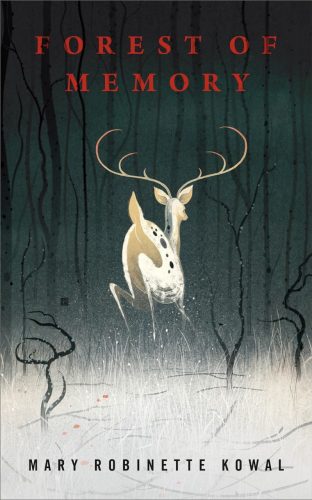I’m steadily working my way up to total fanboy status regarding Mary Robinette Kowal’s work. As I’ve mentioned several times on the blog, her insight, perspective, and wit are one of the great draws of Writing Excuses, and her work that I’ve read (Shades of Milk and Honey, The Lady Astronaut of Mars, and her contribution to the Shadows Beneath anthology) I have absolutely loved.
I have her most recent novel, Ghost Talkers, on my to-read list, as well as Word Puppets, a collection of her shorts, but the book that drew me first was Forest of Memory, a novella published by Tor.com. The cover art, by Victo Ngai, of a surreal forest with an etherial buck jumping away from the viewer, captured my attention wholly.
Paired with the title, the image piqued my interest, and I wanted to know how the seemingly disparate images would connect to each other.
What I found in the novella is yet another example of Kowal’s stellar craftsmanship. The world, though never explicitly seen, feels enormous and lived-in, and the characterization is shows remarkable depth for its quickness.
Forest of Memory also asks a question that is increasingly important these days: in a world of perpetual connectivity, what would it feel like to suddenly find yourself alone? Unable to reach out to the entire world at a moment’s notice? Cut off from the global conversation?
I think about it often, because while I used to disconnect for several months at a time (as a result of working in the mountains), I haven’t truly disconnected from the web in almost a decade.
Almost 10 years of using the internet every single day. It’s remarkable. I wonder if it’s an inextricable part of my life and future. But it’s not all bad, of course. I socialize on the web, and have used the internet to build a life for myself in the writing community, which has been terrifically rewarding and healthy, not to mention profitable in some ways. I use the internet to learn, to laugh, to play, to connect. But I also use it to distract, to numb, to shout into an echo chamber with rage at the political problems of today. It is counterproductive and addictive.
What would it be like to lose something so wonderful and so destructive??
Kowal’s story is near-future science fiction, where the internet is ubiquitous, and devices are directly integrated into the body and brain. The protagonist collects antiquities, and deals in authenticity—the sale of legitimate artifacts and their stories. That last bit might be a little on the nose, but it’s worked well into the plot and setting, and it doesn’t feel as overbearing as it might have with a less skilled author. It does raise a good point, though. Digital facsimiles are all around us, and there may come a time, soon, when replicas are more readily available than the real thing.
I’m digressing from the story again. Spoilers follow, so if you want to read Forest of Memory—and you do—come back here when you’ve finished the 88-page story.
Kowal’s protagonist is riding along on a highway through the forests Oregon when a group of deer cross her path. She stops and begins recording them, knowing she can sell this moment, this experience, on the web. The moment is interrupted when one of the group, a buck, is shot. An illegal act. The hunter appears and begins working on the body of the buck, so the protagonist tries to run. She, too, is shot. Tranquilized, it turns out. Like the buck.
She wakes, kidnapped by the hunter, who is doing something to the bucks and deer. When she tries to use her tech to connect to the web, to call for help, she discovers that she can’t. She’s offline. She is terrified.
What follows is her strange captivity, watching the man work, wondering what he’s doing to the animals before releasing them, coming to some sort of terms with the discomfort of being disconnected. The hunter assures her that, once his work is done, he will release her and she’ll be able to connect to the net.
She tries to sleuth out what he’s doing, and the reader is lead to understand that he’s installing some sort of signal-blocking technology into the animals, so that the web doesn’t work around them. Through their conversations, he informs her that a wealthy party is interested in having him complete the work, and is additionally interested in purchasing an antique from her—a typewriter—and a story written on the selfsame typewriter about her experience. After her days of captivity, she is released, and soon is able to reconnect to the net.
The experience shakes her, but leaves her (largely) unharmed. For me, reading it, I was left thinking about technology addiction, unadulterated appreciation of nature, and just how good Mary Robnette Kowal is at this whole “writing” thing.
I can’t wait to learn more from her. (I took a short story class with her earlier this year, and am attending the week-long writing excuses cruise this July.)
Forest of Memory is available on Amazon.


